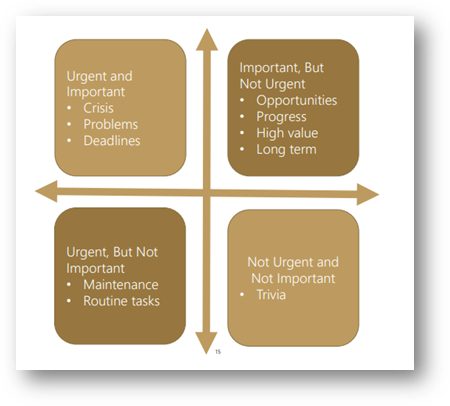
Five Tips to Setting Attainable Goals that Motivate Us and Allow Us to Grow as Individuals
- Published
- Oct 3, 2022
- Share
Creating, maintaining and completing the goals we set for ourselves is a great method for continuing to grow as individuals, both personally and professionally. The reality often is, however, staying motivated to complete said goals can often feel like a struggle for many of us. One of the main reasons we feel this way is that many of the things we need to accomplish in the day-to-day minutia of our lives do not motivate us, even know they need to get done.
When I’m coaching clients who may feel unmotivated, I like to start by asking what their current goals are, in both the long and short term. From here, we can assess why they may feel that way and then start to build goals that promote growth. Then they can be invested in as individuals rather than for external sources.
As humans, completing goals feels good for a reason; it’s in our nature to set and achieve them. Here, we’ll discuss how motivation is unique to us as individuals, how to strategically create goals that drive us, and practical strategies to stay motivated when sticking with our goals.
Understand Why Goals Motivate Us and Chores Don’t
As humans, we operate with an innate goal-oriented behavior to find motivation in what we do. We often set goals without realizing them in order to initiate, guide and maintain said behavior. Even though we know motivation is there for all of us, we still often struggle with how to find or use it in the right ways.
Take chores for example. Washing the dishes isn’t something we’re typically motivated to do. It can even demotivate us when looking at the pile of dishes in our sink. This is where strategic goal setting comes into play for motivation. By creating goals that are specific to the things that drive us as individuals, we can create motivation for ourselves to complete things. This can be whether it’s getting into a new routine at work, staying consistent with a diet, or keeping your sink clean.
Figure Out What Motivates You (and What Doesn’t)
One of the most important steps in finding motivation through goal setting is understanding the unique factors that drive us. It should go without saying that as individuals, we want and are motivated by different things. By understanding what motivates you, the goal-setting process becomes much clearer.
In order to figure out your real goals, we need to first understand the intrinsic details of what really matters to us. These are based on the values, beliefs, experiences and behaviors we hold. A tool I often use with clients to help them better understand both what motivates them and those around them is the DiSC Assessment.
I am very driven by both continuing to learn and helping others. Because I understand these are things that motivate me, I’ll often set goals that align with them. For example, I’ll have a goal of becoming a better consultant to my clients by continuing to expand my own skills. Along with playing directly into one of my core values, this goal is also measurable through client feedback metrics and one that helps me stay motivated when working through day-to-day deliverables that can often feel like taxing chores on their own.
Additionally, it helps to understand what doesn’t motivate us. Avoidance goals are often not effective (e.g., weight loss). Your goal shouldn't be to avoid eating a slice of cake, because your brain recognizes a short-term goal the same way it does a chore. Avoidance goals also prime the brain to think about whatever we’re trying to avoid more often. In some ways it draws your attention to whatever that may be, in this case cake, making it more likely to fail.
Additionally, extrinsic “carrot-on-a-stick” type goals are often only effective if we care about the person offering them.
Ensure Your Goals Are Attainable
While setting goals is a great way to create motivation, one of the most difficult parts of completing a goal can still be finding the motivation to do so, ironically enough. This is because often we can be overconfident and set goals that aren’t realistic or attainable in the first place.
We’re probably all guilty of setting a New Year's resolution, only to drop it a few months later. This is because our interests grow and change constantly, making large annual goals easy to lose track of. Consider setting monthly, weekly or even a daily tangible goal of one thing you’d like to accomplish. By doing this, we can stay productive and feel good about consistently completing them.
Additionally, consider the “middle problem” when creating digestible and attainable short-term goals. This is the idea that we are most motivated at both the beginning and end of our goals, having the most difficult time during the middle part. Because of this, creating week-long goals can help minimize that “middle time,” because the mid-point would only be Wednesday.
Along with choosing proper timeframes for your goals, it also helps to make them measurable. For instance, setting a goal to get in shape can mean a lot of different things, making it hard to ever truly complete it. By setting a goal of going to the gym three times a week for a month, you’ll be more able to track your progress and see success at the end of it.
Group affinity can also be a very helpful motivator for accomplishing goals. Whether it’s a group of friends or your co-workers, we tend to work better and hold ourselves more accountable to our goals as a team rather than alone.
Prioritize, Don’t Compromise
When looking at our list of tasks, goals and chores, it can often feel overwhelming when thinking about how to accomplish them all. When we feel this way, prioritization is everything. And while each of these items may be important, not everything is urgent.
Below is a helpful alignment chart that we can use to prioritize our tasks, stay motivated and accomplish our goals.

Failure Isn’t the End
Finally, when it comes to setting effective goals that motivate us, it’s important to note that falling short is not the end of the world. We set goals to grow as individuals and improve at things that are important to us. And because it’s impossible to be good at everything, it’s important to reassess how we look at failure by becoming strategic with it. Ultimately, if you fail, you’re still growing and making strides to grow. Assess what you learned and what motivated you throughout the process and where you can build in the future.
The Bottom Line
Everyone finds and harnesses motivation in different ways. When it comes to setting and completing goals, it’s not only a great way to grow in our personal and professional lives, but it’s baked into our nature. So, the next time you’re setting goals for yourself, consider these tips to ensure they’re effective to your own motivators, realistically attainable and promote growth.
What's on Your Mind?
Start a conversation with Natalie
Receive the latest business insights, analysis, and perspectives from EisnerAmper professionals.










